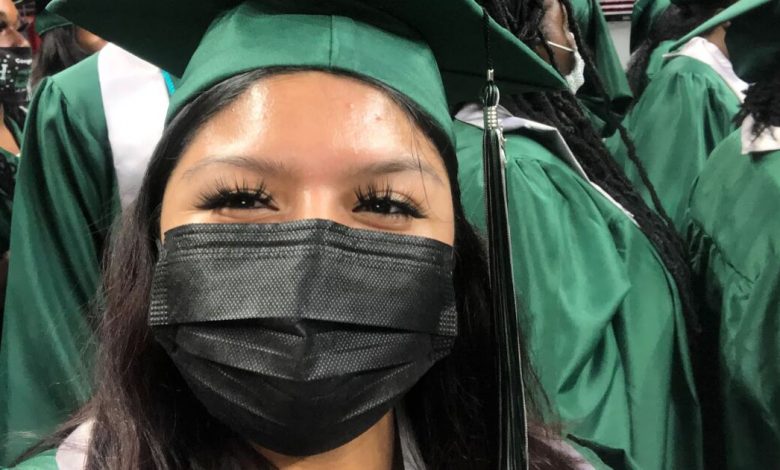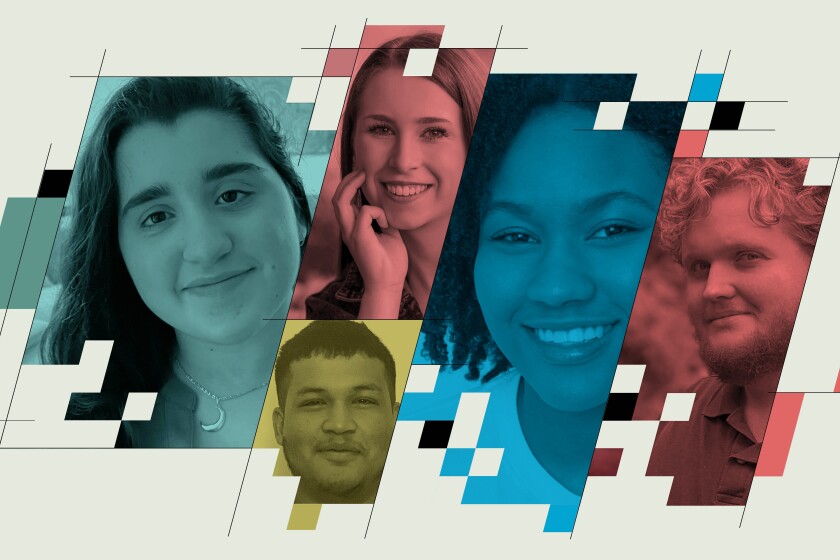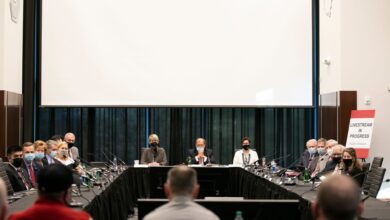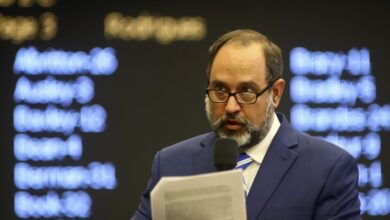One Undocumented Student’s Anxious Search for a College

But some things, she learned early on, just weren’t possible. Her mother had always told her that many doors in her future likely would be closed. This wasn’t discouragement — just a fact. “Because I wasn’t from here,” she says.
Born in Mexico, she was a toddler when she crossed into Arizona with her parents. The family made their way to suburban Maryland, where her father worked construction jobs. They moved a few times before settling into an apartment. And they stayed close to home.
U.S. citizens carrying official ID cards can hop on a plane without a second thought, but for undocumented immigrants hoping to avoid brushes with the authorities, domestic travel is either impossible or risky. When her mother sat her down and explained that she couldn’t fly to Disneyland on a trip some other parents were planning, she was confused, then frightened. She didn’t want to do anything that could put her family in danger. She didn’t want to be sent back to a country she had never really known.
Later, her friends brought her a souvenir from California: a red Mickey and Minnie Mouse keychain. The sight of their bubbly, cartoon grins made her happy. But she felt angry, too. There were things she couldn’t do because of circumstances beyond her control, because of a choice to cross the border — a choice she hadn’t made for herself.
She would feel this anger again years later while applying to colleges and hoping to end up with a few affordable options. Or even just one.
Meals together were important. R.’s mother made tortillas from scratch, and their scent would hang in the air. On nights when her father worked late, they waited until he came home to eat dinner.
She learned English alongside her mother, who used a Spanish-English dictionary to translate homework assignments, schedules, and announcements. R. liked absorbing new subjects; studying hard was automatic. Over time she made many friends, telling a handful of her closest ones that she had been born in Mexico.
R. attended a magnet high school with a science-and-technology emphasis. She excelled there, taking advanced courses and three years of Chinese language. She spent much of her free time volunteering for a local food bank. And she daydreamed about becoming a doctor, maybe a surgeon, or a nurse.
On her way to graduating from high school with honors, R. seemed like an applicant who would have plenty of postsecondary options. She applied to two-dozen colleges and received acceptances from most of them. But none offered her enough financial aid, not even close. She got into a prominent public university in Maryland, but she had no way of covering the five-figure gap .
Like each of the estimated 100,000 undocumented students who graduate from high school each year, R. is ineligible for federal grants, loans, and work study. Her parents have scant savings and no viable way to borrow.
Though there are some private and institutional scholarships for undocumented students, R. happened upon several scholarships open only to U.S. citizens or residents or those who have a Social Security number. One day, she pulled up the application for a nursing scholarship at one of the private colleges she was considering. As she read the requirements line by line, she felt her excitement growing. I can actually get this, she thought.
But then she saw the last bullet point, stating that recipients had to be a U.S. citizen or possess a valid immigration document. “The one thing I didn’t have,” she says. And it hurt.
Anxiety drained R. For months she would wake up at 3 a.m. and just lie there. She didn’t know how to piece together her future. Her school counselor was helpful, but she came to think she hadn’t leaned on him enough. She didn’t know the questions to ask or how to use the resources he had.
As her senior year wound down, R. held herself together. But this proved more difficult as graduation neared and her friends kept talking about the colleges they had chosen, the scholarships they had snagged, the dates when they would pack up and move away.
“What about you?” they asked.
R. didn’t know what to tell them. She didn’t know how to explain that while they would be settling into far-flung campuses this fall, she would be living at home and attending a community college. A fine option, but not the one she had long imagined for herself.
After graduation, R. caught up on sleep, watched Netflix, and volunteered for the food bank. Some nights she broke down at the dinner table, feeling devastated because she didn’t have more choices. Her mother told her not to worry, assuring it would be OK to take a year off and look for a job that didn’t require her to have a work permit or Social Security number.
But R. didn’t want to pause. She wanted to keep throwing herself into her studies. She feared that taking a year off would unravel all her hard work.
In late June, R. was worn down from worrying when her close friend Vicky invited her to an awards luncheon, in Northern Virginia. “OK,” she said. She figured it would be a nice ceremony and nothing more. But she was wrong.
The ceremony was held at a country club where lunch was served. A friendly woman sitting next to R. struck up a conversation over the salad course. Her name was Jennifer Jessie, a tutor and college adviser based in Woodbridge, Va. She was there because one of her students was getting a scholarship, too.
After hearing a little about R., Jessie asked about her plans for the fall.
R. paused and said, “Undecided.”
Jessie didn’t want to pry, but she was intrigued. She wanted to know why the bright young woman beside her seemed so down about her future. Gently, she asked R. a few more questions, about the courses she had taken, the grades she had earned. After learning that R. had no affordable options, she felt something: an urgency to try to solve a problem.
Jessie, who is Black, had helped many young women of color get to college. She knew that first-generation students often tackle problems on their own, neglecting to seek help from an adult who could show them how to navigate the admissions process. Often they don’t know what kind of help to seek. “They need a wingman,” she says, “like in Top Gun.”
Jessie also understood that the way some adults talk about paying for college can warp a student’s self-image. “We build this scholarship narrative up so much, and that is: If you work hard and do everything that you’re supposed to, scholarships will rain out of the sky. And then when students don’t get any, they say ‘Oh, I didn’t do enough.’”
That was exactly how R. felt.
Something about the way Jessie asked questions put her at ease. For weeks she had suppressed thoughts about her future as if willing herself to stop caring about it, and now a stranger was expressing an interest in that future. During the ceremony, R. whispered to Jessie. “There’s something I have to tell you.” She then told the stranger that she was undocumented immigrant, a fact she previously had shared only with Vicky and few other people.
Jessie understood. As the ceremony went on, she devised a plan. She knew several people who worked in the admissions realm. And there was one in particular she wanted to contact.
After the ceremony, Jessie hugged R., who felt a torrent of emotions. She cried. Jessie cried, too. Then she looked the young woman in the eye. “There’s a college out there looking for you,” she said. And at that moment R. believed it.
Whitten texted Sarda. Was St. Mary’s still accepting applications? Still offering financial aid? The answer to both questions was yes. After Whitten relayed some basic information about R., Sarda thought about everything he had just heard. So he called his boss and told her about R.
“This is what I’m thinking …” he said. “Am I crazy?”
They were on the same page.
Sarda, the son of Guatemalan immigrants, was moved by R.’s story and impressed by what he had heard so far. She sounded like an excellent student who could thrive at St. Mary’s, where more than 60 percent of students identify as Latino/a or Hispanic.
Whether R. would want to come all the way to Texas was one question. And whether St. Mary’s could give her enough financial aid was another. She would need a full ride or close to it. Sarda called the university’s financial-aid director to discuss some possibilities.
First R. had to complete an application. She couldn’t use her Common Application account because she had already used it to apply to the maximum number of colleges (20). So she would use the university’s application instead. After Jessie passed along Sarda’s email address, R. wrote to him and forwarded a copy of her high-school transcript. She thanked him for considering her.
R. told Sarda she would submit her application on a Friday. Later, she wrote back to say that she would finish it over the weekend because she was planning to spend all of that Friday volunteering. That impressed him. At a moment when she had every reason to put herself first, she was doing the opposite.
The admissions staff reviewed R.’s application, in which Sarda saw evidence of selflessness and inquisitiveness. Days later, St. Mary’s offered her a spot in its freshman class. Then it sent her a financial-aid package knocking all but about $3,000 off the full cost of attendance, more than $50,000 a year.
The university couldn’t do this for everyone. But that didn’t mean it shouldn’t do it for someone, Sarda thought.
When the offer arrived, R. felt waves of gratitude. Then doubt struck. A door had just opened, but to step through it she would have to leave her family far behind and walk into the unknown. And she would have to find a way to get herself to the campus, a 1,600-mile drive away.
But Texas’ government was increasingly hostile to people in her situation. Gov. Greg Abbott, a Republican, has proposed declaring that there is an “invasion” of undocumented immigrants, which would allow the state to enact war powers and deport them. Though R. didn’t worry as much as her mother and father did, she thought about the vulnerability of her situation. Eligible for protection against deportation under the Deferred Action for Childhood Arrivals program, known as DACA, she stopped short of completing the application process several months ago on the advice of lawyers. With the future of the program in limbo, they advised her not to enter her name into the system.
Still, R. believed that St. Mary’s had given her a once-in-a-lifetime offer, a chance to carve out a better life and set an example for her siblings. She sought Jessie’s advice during Zoom chats. One night she texted Sarda and asked if she could call him, and soon he was on the phone with her and both of her parents.
In mid-July, Sarda visited the Washington, D.C., area for an enrollment conference. He invited R., her parents, and Jessie to meet him for dinner — his treat. He asked R. to pick the restaurant, so she did: Mexican. His goal was to put the family at ease, answer all their questions, and help them make a decision, whatever it might be.
At the loud, cavernous restaurant, R. sat down next to Sarda.
“So how are you feeling?” he asked.
“Nervous and excited,” she said.
R. thanked him for the opportunity St. Mary’s had offered.
“We aren’t giving you anything,” he told her. “You have earned everything.”
Sarda wanted her to believe in herself, to see her future as her own.
“You don’t give yourself enough credit,” he told her. “Be unashamed about being awesome. You’re give, give, give. It’s OK, even if it’s scary, to take a minute and think, ‘It’s OK to be a badass.’ You can go back to being humble in a minute.”
R. smiled and nodded. She was wearing red and sipping a pink, nonalcoholic guava colada.
For two hours, Sarda listened and answered R.’s questions. (Would she get to choose her own dorm? Would the cost of attendance vary depending on the major she chose?) He spoke to her parents in Spanish, drawing them out and making them laugh. At one point R.’s mother asked Sarda what questions parents usually have; she wasn’t sure what she was supposed to ask.
St. Mary’s enrolls a small number of undocumented students. Sarda told R. that the campus would protect her anonymity and nurture her in ways that would allow her to have the same kind of experience other students did: “No place is perfect and no place can guarantee anything, but we try to create a supportive environment that feels safe.”
This wasn’t a recruitment dinner; there was no hard sell. Sarda told R. she didn’t have to make a decision that night. After a dessert of flan and tres leches cake, he turned to her. “I think you know what you want to do already,” he said. “Am I right?”
R. looked at her parents one by one. She had tears in her eyes. So did her mother. Sarda and Jessie stepped outside to give the family a moment.
A few minutes later, R. emerged with her parents. She said she needed a little more time to think. Her father quietly told Sarda that he would give up a kidney if it would help her, that as much as he would miss her, no le quiero cortar las alas. He didn’t want to clip her wings.
On the sidewalk, as heavy raindrops fell, Jessie talked to R. and her parents about getting to Texas. R. lacked official documents, even a Maryland driver’s license, so she wouldn’t be able to board a plane. A road trip to San Antonio would require creativity.
R.’s mother asked Jessie if she would accompany her daughter to orientation, in mid-August. Yes, she said. She would drive her all the way there. Sarda explained that he was in touch with some friendly contacts, including a professor in Ohio, who were willing to put them up for a night, no questions asked.
But would R. end up going? After she told Sarda that deadlines help her focus, he told her to contact him on Monday. “If you tell me that you need until Tuesday, that’s fine,” he said. “I’m proud of you no matter what you decide.”
In the car, R. reflected on everything that had happened. For weeks she had felt what she calls “the weight of caring.” She felt it for her little brothers, who depended on her each day. She felt it for her parents, who relied on her to translate documents, direct them to resources, and help them figure out tech stuff. She felt it for the people she often served in her community. What’s going to happen, she thought, if I’m not there?
All those thoughts felt like ties binding her to a place she knew well.
R.’s story was about how a handful of dedicated people went out of their way to help one student in need. But it was also a story about a process that’s broken. A system in which opportunities for marginalized students so often depend on luck isn’t a fair system at all.
Still, for R., the offer from St. Mary’s felt like something that was meant to happen. God is paying back all your hard work, her mother told her. The long chats with Sarda and Jessie over dinner that Saturday in July left her feeling at peace.
On Sunday afternoon, R. went into her parent’s bedroom and closed the door. Her mother and father sat on their bed, and she perched a few feet away on the bed where her little brother sleeps.
R. told them that she had decided to go to St. Mary’s. She saw tears in her mother’s eyes, which she had expected, and in her father’s, which she hadn’t. They told her they supported her decision. They talked for hours, and when they finished, the sun was gone. R. washed some dishes and went to sleep.
Under her bed was a box containing the Mickey and Minnie Mouse keychain she had kept — a souvenir from a place she had never seen. But she believed that one day, somehow, she would.
Source link







